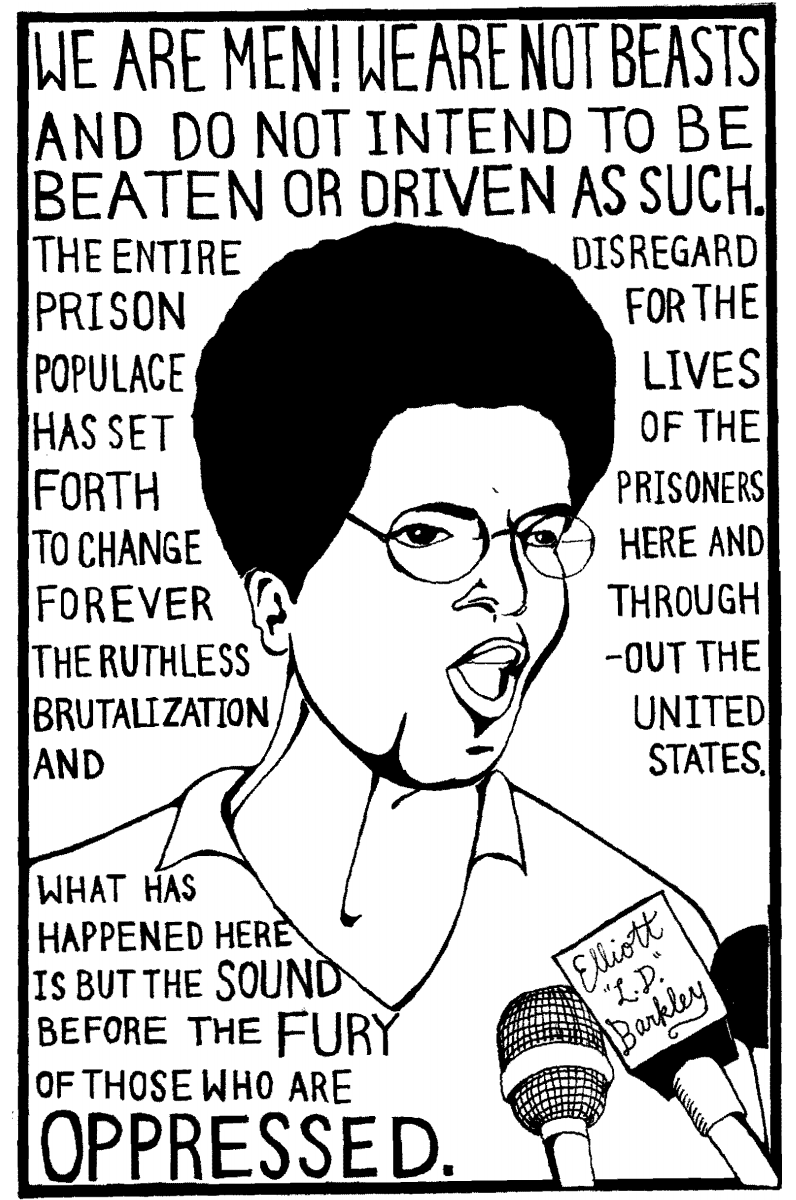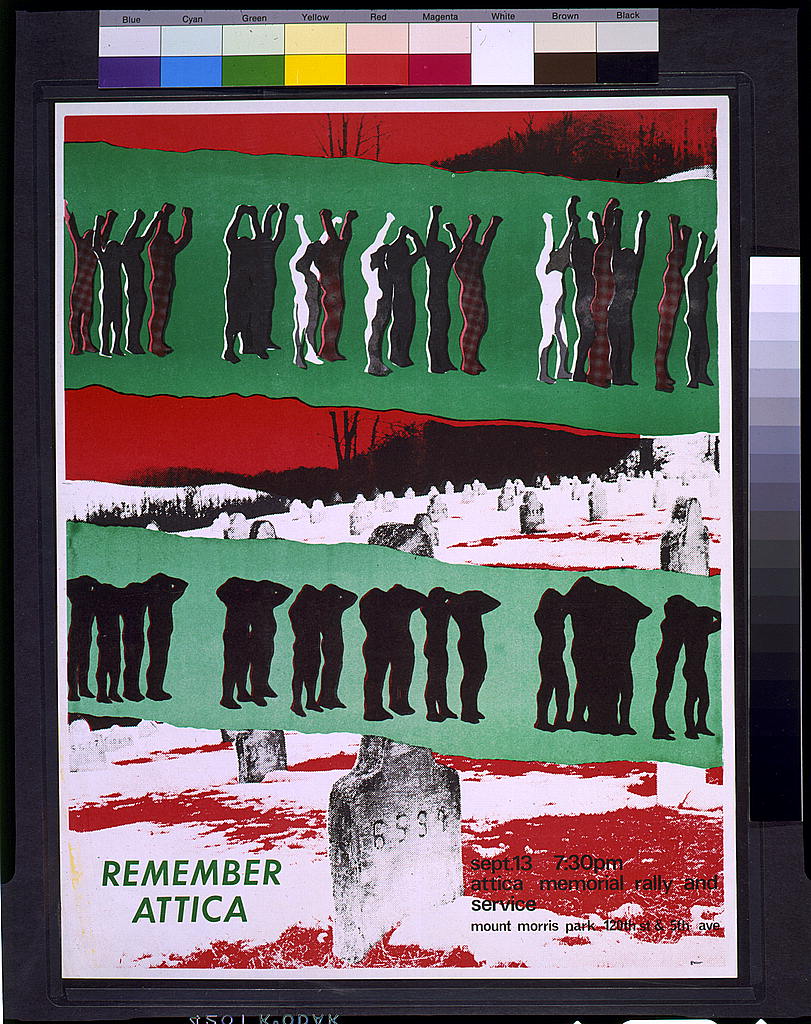This September marked the 50th anniversary of the uprising at the Attica prison in upstate New York, which led to the deadliest massacre of incarcerated people in the history of the American penal system. Ten years ago, Project Nia, a grassroots organization, paid tribute to the legacy of that uprising with a resource that highlighted the voices of those who organized it and experienced its immediate aftermath.
Inquest is reprinting a few selections from this primer below, both as a way of remembrance and to underscore that the struggles of those who lived and died at the hands of the state at Attica 50 years ago are not unlike those experienced in U.S. prisons today.
Mass incarceration as we know it today hadn’t yet exploded when Attica did in 1971. But the words of the men who hoped to end the harms of the system then echo in the clamors for change today — on Rikers Island, in the Georgia prison system, in St. Louis, in California, and everywhere that the violence of imprisonment continues to exact a toll on human lives.
From September 9 to 13, 1971, prisoners took control of the Attica Correctional Facility. They made a series of demands to prison administrators and held about 40 people as hostages. After four days of fruitless negotiations, Nelson Rockefeller ordered that the prison be retaken; 39 people were killed in a 15-minute assault by state police. The New York State Special Commission on Attica (also known as the McKay Commission) appointed to investigate the uprising suggested that: “With the exception of Indian massacres in the late 19th century, the State Police assault which ended the four-day prison uprising was the bloodiest one-day encounter between Americans since the Civil War.”
The uprising did not come out of nowhere. In September 1971 at Attica Prison, there were over 2,200 people locked up in a facility built to accommodate 1,600. 54% of those prisoners were Black and 9% were identified as Puerto Rican. 40% of the prisoners were under the age of 30. One out of 383 correctional officers was Latino and all of the prison administrators were white. It cost $8 million dollars to run Attica Prison in fiscal year 1971-72; that amounted to about $8,000 per prisoner. Most of this money was spent on correctional officers’ salaries (62%). Inmates at Attica spent 14 to 16 hours a day in their 6 by 9 foot cells. They also worked about five hours a day and were paid between twenty cents and one dollar for their day’s labor.
Once the inmates of Attica Prison took over the facility on Thursday, September 9, 1971, a committee of inmates drew up five demands as preconditions to end the takeover. These five demands would be broadened into “15 practical proposals” that would form the basis for the attempted negotiations among the prisoners, the committee of outside observers, state prison officials, and representatives from the governor’s office.
DECLARATION TO THE PEOPLE OF AMERICA (September 9, 1971)
by The Inmates of Attica Prison, read by L.D. Barkley
The People of the United States of America: first of all we want it to be known that in the past we have had some very, very, treacherous experiences with the Department of Correction of New York State. They have promised us many things and they are giving us nothing except more of what we’ve already got: brutalization and murder inside this penitentiary. We do not intend to accept to allow ourselves to accept this situation again. Therefore, we have composed this declaration to the People of America to let them know exactly how we feel and what it is that they must do and what we want primarily, not what someone else wants for us. We’re talking about what we want. There seems to be a little misunderstanding about why this incident developed here at Attica and this declaration here will explain the reason:
The entire incident that has erupted here at Attica is not a result of the dastardly bushwhacking of the two prisoners, September 8, 1971, but of the unmitigated oppression wrought by the racist administrative network of this prison throughout the year. We are men. We are not beasts and we do not intend to be beaten or driven as such. The entire prison populace, that means each and every one of us here, have set forth to change forever the ruthless brutalization and disregard for the lives of the prisoners here and throughout the United States. What has happened here is but the sound before the fury of those who are oppressed. We will not compromise on any terms except those terms that are agreeable to us. We’ve called upon all the conscientious citizens of America to assist us in putting an end to this situation that threatens the lives of not only us, but of each and every one of you, as well. We have set forth demands that will bring us closer to the reality of the demise of these prison institutions that serve no useful purpose to the people of America, but to those who would enslave and exploit the people of America.
Our demands are such:
1. We want complete amnesty, meaning freedom from all and any physical, mental and legal reprisals. 2. We want now, speedy and safe transportation out of confinement to a non-imperialistic country. 3. We demand that the Federal Government intervene, so that we will be under direct Federal Jurisdiction. 4. We want the Governor and the Judiciary, namely Constance B. Motley, to guarantee that there will be no reprisals and we want all factions of the media to articulate this. 5. We urgently demand immediate negotiations through William M. Kunstler, Attorney at Law, 588 9th Avenue, New York, New York; Assemblyman Arthur O. Eve of Buffalo; the Prisoner Solidarity Committee of New York; Minister Farrakan of the Muslims. We want Huey P. Newton from the Black Panther Party and we want the Chairman of the Young Lords Party. We want Clarence B. Jones of the Amsterdam News. We want Tom Wicker of the New York Times. We want Richard Roth from the Currier Express. We want the Fortune Society; Dave Anderson of the Urban League of Rochester; Brine Eva Barnes; We want Jim Hendling of the Democratic Late Chronicle of Detroit, Michigan. We guarantee the safe passage of all people to and from this institution. We invite all the people to come here and witness this degradation so that they can better know how to bring this degradation to an end. This is what we want.

The 15 Practical Proposals
handed to Commissioner Oswald by prisoner Jerry Rosenberg
1. Apply the New York State minimum wage law to all state institutions. STOP SLAVE LABOR. 2. Allow all New York State prisoners to be politically active, without intimidation or reprisals. 3. Give us true religious freedom. 4. End all censorship of newspapers, magazines, letters, and other publications coming from the publisher. 5. Allow all inmates, at their own expense, to communicate with anyone they please. 6. When an inmate reaches conditional release date, give him a full release without parole. 7. Cease administrative resentencing of inmates returned for parole violations. 8. Institute realistic rehabilitation programs for all inmates according to their offense and personal needs. 9. Educate all correctional officers to the needs of the inmates, i.e., understand- ing rather than punishment. 10. Give us a healthy diet, stop feeding us so much pork, and give us some fresh fruit daily. 11. Modernize the inmate education system. 12. Give us a doctor that will examine and treat all inmates that request treatment. 13. Have an institutional delegation comprised of one inmate from each com- pany authorized to speak to the institution administration concerning grievances (QUARTERLY). 14. Give us less cell time and more recreation with better recreational equipment and facilities. 15. Remove inside walls, making one open yard, and no more segregation or punishment.
Poetry from Prisoners
From “Betcha Ain’t: Poems from Attica” (edited by Celes Tisdale, Broadside Press, Detroit Michigan, 1974)
The poems below are the product of a poetry workshop that was intended as a rehabilitative measure for Attica. A series of 8-week poetry workshops began on May 24, 1972, run by Celes Tisdale, a member of the Buffalo Black Drama workshop. Mr. Tisdale selected some of the poems from the workshops and published a pamphlet titled “Betcha Ain’t: Poems from Attica.” The pamphlet includes brief biographical information on the poets.
ATTICA REFLECTIONS It isn’t strange to awake in the silence Of midnights, To hear MEN weeping, in harsh and gravelly voices That turn away your lies, They have witnessed the slaughter And heard your songs of merriment As you filled your cups with blood. Anoint yourselves in madness, Dance with Hitler’s ghost. By Hersey Boyer Born: August 19, 1941. Education: 9th grade Junior High School. Birthplace: New York City, Harlem. Time: Life. Desire in life: to be a man wherever I am!
FORMULA FOR ATTICA REPEATS …..and when the smoke cleared they came aluminum paid lovers from Rock/The/Terrible, refuser of S.O.S. Collect Calls, Executioner. They came tearless tremblers, apologetic grin factories that breathed Kool smoke-rings and state-prepared speeches. They came like so many unfeeling fingers groping without touching the 43 dead men who listened… threatening to rise again… By Mshaka (Willie Monroe) Diminutive, incisive young man who was released from the prison and transferred after two sessions in the workshop
Excerpted from Attica Prison 101: A Short Primer, published by Project Nia. Reprinted with permission.
Image: Library of Congress
